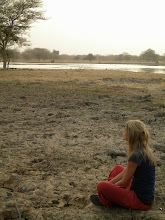I sit at a table, hands beading sweat in nervousness, a white twenty-four-year-old American amongst mostly middle-aged African men. Many of the Malian women here bear small children wrapped tightly to their backs with bright West African fabric, most making themselves look small and unassuming at the periphery of this conference. I want to ask them a question that will undoubtedly elicit a response that makes my stomach knot. A white banner streams in the background, half-lit by the brutal sun under a canopy of mango trees, bearing the words “Espacement de Naissance et Planification Familiale” – Birth Spacing and Family Planning. To my right sits a thick-spectacled, weathered man – an Imam, or Muslim spiritual leader. On the other side, a female radio-journalist. Across from me is a traditional medicinal healer, next to him the mayor and a local doctor. I look at these men and women and want to ask:
“How many children have you lost in your lifetime?”
Many couples here would respond with a figure around two or three, all children who died in the first few years of their lives or during birth.
“How many of you have sisters, mothers, wives, friends who died during childbirth?”
According to Amnesty International, every ninety seconds a woman somewhere in the world dies giving birth.
But before I can ask these questions, I am met with a question of their own: “When do we get paid for being here?”
Every one of the more than 120 people assembled here will receive the equivalent of 10 US dollars per day to be asked these questions. We are paying for their attention, because otherwise, in this patronage-based, foreign aid- and colonialism-corrupted system we have helped to create, many would not be present.
Everyone here has a different price tag for their attention – a certain sum to permit them to think about the fact that many girls here give birth to their first child around the age of 14, that often they will become pregnant again soon after giving birth and may have well over five children in their lifetime, and that very few will do so at anything resembling a modern medical facility.
Later I will meet with a group of media representatives, and they will burst with excitement about radio programs on maternal health and family planning, only to have half of them refuse to return our phone calls when they learn we will not pay for their programs.
A few of the Muslim leaders will tense up and stop listening when they hear we will not pay them to meet with us.
Public officials and even midwives will stir up a frenzy when they learn that their per diem is no greater than that of those lower down the hierarchical ladder.
Too many will retract their attention when it is not paid for, and I fear their sisters and daughters will continue to suffer the consequences.
But then the eldest of the Muslim leaders stands up in his group, insisting that it is Allah's will to protect our wives and daughters. He will inspire the group to lead mass prayers on the importance of maternal nutrition and birth spacing.
A male radio-journalist scorns his colleagues for having their interests in their pockets, rather than in the public good. He will launch a 3-month media campaign on family planning, and others will follow.
A doctor will emerge from the mass of his resistant colleagues and offer to donate his time and effort to train village-based health workers.
A nonprofit will put on a film and theater sketch on contraceptive use to the public, free of charge.
And, one by one, we will reconstruct this system into one where we all freely and passionately pay attention to the lives of women. My hands no longer sweat anxiously, and I hope that some day, the knot in my stomach will be gone.
